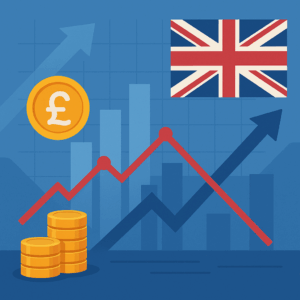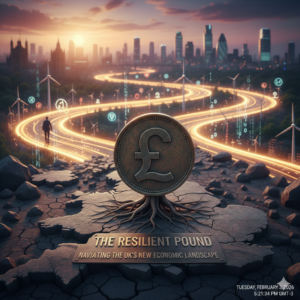
What you need to know about how the UK economy is doing and the trends to look out for that could affect your finances.
As 2025 takes shape, the UK economy faces varied and challenging global currents. From the ups and downs of interest rates and inflation to changes in consumer spending and the jobs market, there are chances to gain, and lose, from the months ahead for Britain’s households.
In this piece we take a closer look at what is driving the UK’s financial forecast for 2025 and how changes to it might affect your individual finances, savings and investments and your everyday spending.

📊 The U.K. Economy in 2024: The Readers Weigh In
Before we consider the future, it’s crucial to know where we’ve been. in 2024, the economy of the UK saw:
- Growth remains moderate at some 0.7%, thereby avoiding a technical recession but continuing to underperform relative to the pre-pandemic level.
- Ongoing inflationary pressure, albeit eased to about 3.5% by year’s end, due to tougher monetary policy.
- Resilient labour market, with unemployment at about 4%, even amid global uncertainties.
- A string of interest rate rises by the Bank of England (BoE) to fight off inflation, pushing the base rate up to 5%.
Both of these trends create an environment of cautious optimism and enormous challenges in 2025.
🏦 1. Interest Rates expected to Stabilise in Monetary Policy
The Bank of England is poised to tread lightly on interest rates through the whole of 2025. Beyond, additional rate hikes seem improbable considering moderated inflation, but serious rate reductions are also likely postponed until there’s more proof of continued slowdown in the economy.
Implications for consumers:
✅ Mortgage holders on variable rates could receive reprieve as the hiking cycle comes to an end, with the BoE’s comments.Non-football interests: Scotland, Pepperami, sponsorship and investment up to five years.
✅ Fixed-rate borrowers should be watching the market for any refinancing opportunities.
✅ Savers may still be able to enjoy relatively high returns compared with the ultra-low rates of the previous decade.
💸 2. Inflation: Down but Still High
UK inflation has been on a steady downtrend since spiking to over 10% in late 2022.
The Office for National Statistics (ONS) projects that inflation will run at between 2.8%–3.2% throughout 2025—high, still, but not terrifyingly so, compared with the 2% target.
What this means for you:
✅ Prices for necessities like food and energy are likely to level off, relieving some pressure on household budgets.
✅ Real wages (which take into account inflation) could start to climb a little, making consumers feel wealthier.
✅ But some sectors — specifically housing and health care — may still see disproportionately high price growth.
🏠 3. Housing Market: A Muted and Uneven Correction
The UK property market has started to make a correction after years of being propelled by soaring house prices.
The combination of:
- Higher mortgage rates
- Stricter lending criteria
- Slowing economic growth
…has resulted in a similarly modest fall in house prices, of around 3% by early 2025.
What to expect:
✅ First-time buyers may have more luck getting in. Prices are softening, and competition may be, too.
✅ Homeowners may see their home values stagnate or fall a little, although most analysts do not expect them to collapse.
✅ Buy-to-let will become less lucrative for landlords because of higher borrowing costs and changes to the rules.
🛍️ 4. Consumer Spending A Wary Recovery
Consumption is still the biggest driver of the UK economy.
5 YEARS FROM NOW, 2025 Confidence spreads in consumer circles:
- Lower inflation
- Stable employment
- The growth of wages faster than the rise of prices
Yet with so many households still working on repairing finances after years of squeezed budgets, they need some room to stretch out.
Key trends:
✅ More on experiential spending (travel, but also dining and entertainment) post long, long deprivation.
✅ Continued demand for discount retailers and value brands as budget-conscious shopping remains.
✅ Growing interest in financial products, like savings accounts and investment platforms, as consumers seek to rebuild wealth.
📈 5. Employment and Pay: Steadiness and SectoralShifts
The labour market in the UK has been surprisingly robust throughout the economic shocks.
2025 projections:
✅ Low unemployment will continue, somewhere around 4%–4.2%.
✅ Stabilising wage growth of 3-4 per cent, underpinning consumer spending.
✅ Recruiting in sectors like technology, green energy, health care and logistics continues to be strong.
By contrast, sectors closely linked to retail or hospitality can face structural challenges as people change their spending habits and technology automates jobs.
🌍 6. Global Risks and Their Impact
The UK economy is not an island. Several global risks were identified that may influence the 2025 projection:
✅ Potential risks:
- Geopolitical tensions, particularly in Eastern Europe and the Middle East, that have affected energy prices and supply chains.
- China’s economic slowdown and its impact on global trade and demand for UK exports.
- US interest rate policy and global financial markets and capital flows.
Such forces could make financial markets volatile and divert both inflation and growth in the UK.
💼 7. Investment outlook: In search of a path amid uncertainty
Investors can expect a mixed landscape by 2025.
✅ Key considerations:
Stocks: Prospects for modest gains, albeit in sectors that play to long-term trends such as renewable energy and tech.
Bonds: Favorable yields compared with recent years, but sensitive to interest-rate changes.
Real estate: Performance probably remains lackluster as the housing market cools.
Savings: High-interest savings accounts are still a relatively low-risk place to stash cash, but real returns are likely to be eaten away if inflation remains elevated.
🏁 Last Word: What Should UK Consumers Do in 2025?
The economic horizon in 2025 for the UK is cautiously positive.
While dangers remain — from the world picture of turmoil to structural changes in major industries — consumers can take action to protect and enhance their financial well-being:
✅ Pay attention to interest rates as rates decline or rise to refinance or maximize savings returns where possible.
✅ Keep the household budget up and running, with your eyes trained on stubborn inflation.
✅ Continue to invest carefully as you diversify and identify areas for long-term growth.
✅ Be aware of changes in policy, such as in taxation, pensions and property laws.
Put another way, though the worst of the recent economic shocks may be behind us, 2025 could well be characterized by stability over exuberance and prudence over risk-taking.
With a knowledge of these shifts, and by altering your financial approach to keep pace, you can make decisions to safeguard your financial future, and benefit from new prospects in an ever-changing UK economy.
Our Post


The Resilient Pound: Navigating the UK’s New Economic Landscape


